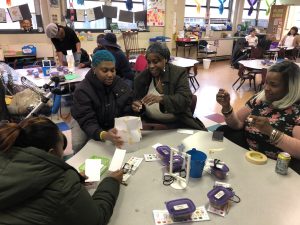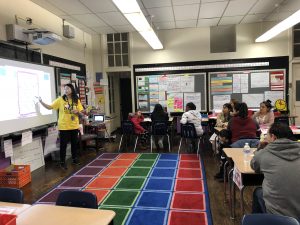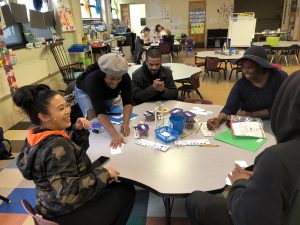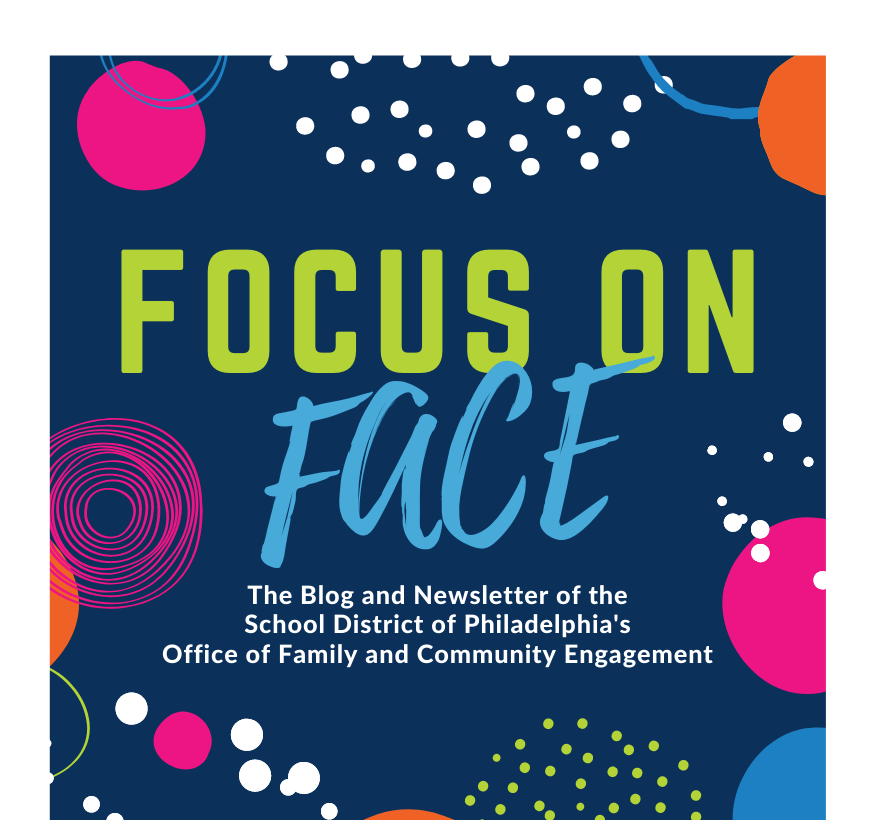 When you think about a report card conference what is the first thing you imagine? Most likely, you think about the teacher doing most of the talking–telling the parent all about the child’s academic performance, areas for improvement, and overall grades. Now imagine a report card conference in which parents are building towers out of index cards and tape, playing flash card games, and having fun! Academic Parent Teacher Teams (APTT) meetings are far more interactive than the traditional report card conference and incorporate even more elements to draw connections between a child’s home and school.
When you think about a report card conference what is the first thing you imagine? Most likely, you think about the teacher doing most of the talking–telling the parent all about the child’s academic performance, areas for improvement, and overall grades. Now imagine a report card conference in which parents are building towers out of index cards and tape, playing flash card games, and having fun! Academic Parent Teacher Teams (APTT) meetings are far more interactive than the traditional report card conference and incorporate even more elements to draw connections between a child’s home and school.
This past school year, several schools have been trialing and improving their APTT meetings in year two of a pilot program supported by the William Penn Foundation and WestEd. These meetings occur three times a year (fall, winter, and spring) and each meeting is 75 minutes long. The structure of the meeting is as follows: an overall breakdown of what the grade-level academic content that your child is learning is, exposure to games and activities to do at home to reinforce learning skills, and setting goals for you and your child moving forward.
During the first week of February 2020, the participating schools were holding their second APTT meeting of the year. These second meetings allowed parents to review their child’s progress since the first APTT meeting, understand a new foundational skill that their child is learning at school, and to see what their child’s progress in this foundational skill is. At James G. Blaine Academics Plus in North Philadelphia, Kindergarten teachers Ms. Jones and Mrs. Brower taught their parents a foundational kindergarten literacy skill, which is to identify the beginning (first) sound when shown a picture or a word. If shown to them, Kindergarten students should be able to identify the sound of a given letter. Ms. Jones and Mrs. Brower explained that this letter-sound fluency is important because it shows that the child can match sounds to letters, can quickly identify sounds, and can help students read words that are more difficult.

After explaining the foundational literacy skill and the importance of it, Ms. Jones and Mrs. Brower showed the parents their child’s data of letter-sound fluency. As the parents looked at the anonymously listed class data, one parent noted that it looks like many children are struggling with letter-sound fluency across the board, so this seems like a skill that parents need to focus on together. Parents were then able to share ideas with one another about how to apply these literacy skills in real life. The parents in the meeting shared valuable thoughts such as making their child read the letters in signs on the street, putting captions on the television, and more. A very valuable part of this APTT meeting when the teachers taught the parents games to practice this letter-sound fluency with their children. After learning games such as a memory card game, the teachers helped parents make goals for their children depending on the data that they were seeing about their children.
In a third-grade context at Francis Scott Key School in South Philadelphia, Bilingual Counseling Assistants (BCAs) were available to help translate the APTT meeting for parents in various languages. Similar to the structure of the Kindergarten APTT meeting over at Blaine, a third-grade APTT meeting at Key started with teacher Mr. Lovannoni introducing an icebreaker so that parents could get to know one another better. At the first APTT meeting, parents learned the list of 400 words that students need to know by the end of the year (sight word fluency). At this second APTT meeting, parents were able to learn how sight word fluency has grown for each student. Mr. Lovannoni celebrated the individual growth of every single student in the class.
After showing the growth and progress of students since the first APTT meeting, Mr. Lovannoni introduced one new foundational math skill as well as a literacy skill. He explained that students have been learning all about space and a foundation skill they need to know is 48 different space-related words and their definitions. He showed his parents the data about how many vocabulary words each student currently knows. Mr. Lovannoni then taught his parents a Bingo Game using these vocabulary words that the parents could take home to play and reinforce with their children. At the end of the meeting, parents had the opportunity to set a goal for their child about how many vocabulary words he could learn: “Today my child knows ___ vocabulary words and definitions. To help my child reach the goal, ___ will practice with my child. By the next APTT meeting, I want my child to know ___ vocabulary words and definitions.”
 Whether in a Kindergarten classroom at James G. Blaine Academics Plus or a third-grade classroom at Francis Scott Key School, the overall structure of these APTT meetings stay the same–the content and foundational skills are what vary by grade and subject. In traditional report card conferences, it can be hard to see parents so engaged, playing games with one another, and even having fun. However, we can see how parents can gain valuable skills to help their children at home so that parents, teachers, and students can all be on the same page!
Whether in a Kindergarten classroom at James G. Blaine Academics Plus or a third-grade classroom at Francis Scott Key School, the overall structure of these APTT meetings stay the same–the content and foundational skills are what vary by grade and subject. In traditional report card conferences, it can be hard to see parents so engaged, playing games with one another, and even having fun. However, we can see how parents can gain valuable skills to help their children at home so that parents, teachers, and students can all be on the same page!

